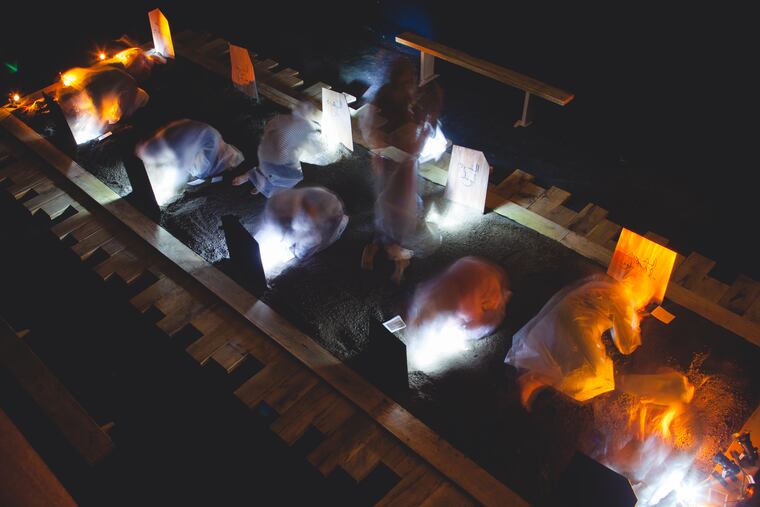At Fringe Fest starting Thursday: Art that involves your body in what it feels like to be a refugee
Beirut-based performance artist Tania El Khoury will have five immersive shows at multiple venues Sept. 6-28.

When Lisa Kraus saw Tania El Khoury's Gardens Speak in Amsterdam, she knew she had to bring the Beirut performance artist to Philadelphia.
Kraus, performing arts coordinator at Bryn Mawr College, called El Khory's work the most affecting political art she's ever seen.
During the immersive Gardens Speak sound installation, audience members are asked to don plastic ponchos and dig into facsimile graves. There, they uncover the narratives of 10 people killed in the ongoing uprising against the Syrian regime and buried in personal gardens.
"I admired Tania's craft because she created a beautiful environment full of sensations that felt gentle but reached me at a profound level," Kraus said. "The experience that day burrowed deep into me, making me curious about all the stories being told and the fates of all the families. It fostered empathy and connection in the most uninsistent of ways, so I knew this was something Philadelphia really needed to experience now."
Gardens Speak, opening Sept. 12 at Bryn Mawr College, is one of five live El Khoury artworks about war and refugees featured at this year's Fringe Festival under the collective title ear-whispered. The audience plays a crucial role in all five.
>> READ MORE: Philly Fringe 2018: The 25 must-see productions (Don't worry, you've got 3 weeks).
>> READ MORE: 'Fly Eagles Fly' brings your Super Bowl mania to stage at the Philly Fringe
Along with Gardens Speak, there's Stories of Refuge, opening Thursday at Twelve Gate Arts on Second Street, during which El Khoury invites audience members to climb into metal bunk beds and watch footage shot by Syrian refugees that portray their daily lives in Germany.
In another work, As Far aAs My Fingertips Take Me, opening Thursday at PII Gallery on Race Street and moving to Bryn Mawr Sept. 15, El Khoury invites a single audience member to interact through a gallery wall with Basel Zaraa, an artist who is also a refugee. During the encounter, Zaraa marks the audience member's arm with paint, illustrating a family's journey from Syria to Sweden. As he paints, the audience member listens to the stories of those who have challenged border discrimination.
And during Camp Pause, opening Sept. 12 at Bryn Mawr, audience members watch videos that show the stories of four residents of the Palestinian Rashidieh refugee camp.
Audiences can also share their Gardens Speak reactions via handwritten notes that become part of a new immersive work, Tell Me What I Can Do, also opening Sept. 12 at Bryn Mawr. In it, El Khoury asks audiences to sift through the notes and reflect upon their shared responsibility.
"My pieces allow people to be in a different way as a spectator," El Khoury said. "It's about allowing your body to be in a different situation while listening to a story."
The exhibitions continue on select dates through much of September.
El Khoury's decision to involve audiences so much in her art grew out of her Ph.D. research at the University of London, where she studied the political potential of interactive live art.
"Political potential isn't about whether the audience agrees with the content of my artwork," she said. "It's about inviting people to embody other people's realities and stories. They can think about their own bodies in relation to state violence, for example."
Her interest in interactive art eventually led her to cofound the Dictaphone Group, a performance collective in Lebanon that questions people's relationships to certain spaces, including public spaces. In many of her works, leading the audience through a physical journey is key.
"I don't want to dictate any kind of emotional journey to people," El Khoury said. "But I do think about audiences as performing the work, like their bodies when they're led into certain spaces. They form a certain image that creates the piece and activates it."
Even though El Khoury's works often deal with heavy subject matter, such as the effects of the Syrian civil war and the harrowing journeys refugees have to go through to find safety, making audience members feel pity is never her goal. Instead, she works hard to make sure the stories of the refugees are told on their terms, giving them agency and control in the creative process.
In As Far as My Fingertips Take Me, Zaraa determines what he wants to say, "so it's not like someone is taking his part and transforming it into something else," El Khoury said. "There's a responsibility in art, just like in mainstream media, to not invite grand narratives and generalizations about groups."